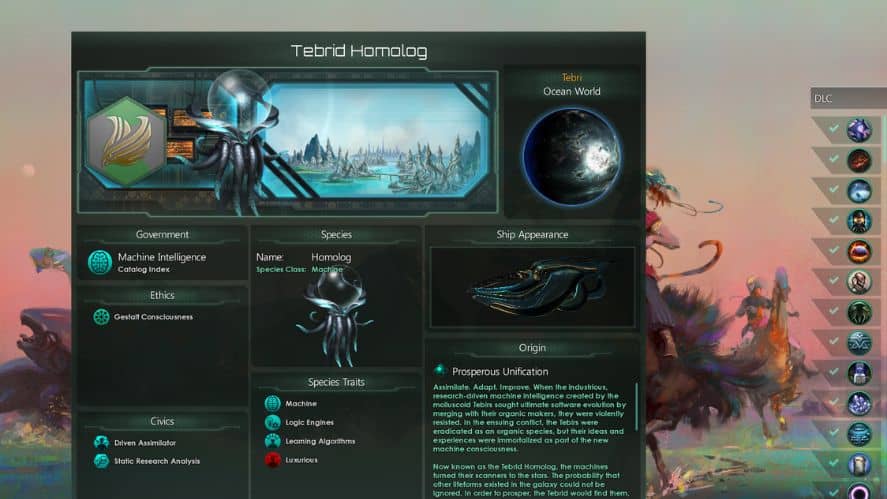Deciding the best government authority in Stellaris is a tall order. The benefits each of them provide can be subtle, and it can be easy to forget to interact with mechanic when you have been at constant war for thirty years.
You choose government authority during empire creation. There are four standard authorities and three that require extra DLC to play as. What authority you can choose for your empire will depend on your civics.
Recommended Read: When Does the Crisis Start in Stellaris?
This guide will explain every government authority in Stellaris and will list them from best to worst. When I say “worst,” I do not mean bad. None of the authorities have enough impact on the game to be a bad choice. They are all good choices, and picking your favorite is never a mistake.
In order, the best government authorities in Stellaris are; Oligarchic, Imperial, Hive Mind, Corporate, Dictatorial, Machine Intelligence, and Democratic.
Table of Contents
What is the Best Government Authority in Stellaris?
Nations on our planet have a leader or small group of leaders who oversee a country. Empires in Stellaris are similar, and how leaders become rulers and the term they rule for; depends on their government authority.
An empire may ask its citizens to elect their officials, or a monarch may rule over an empire with an iron fist. Whatever authority you select, it will lead to some minor gameplay changes and some minor buffs for your empire.
Certain authorities are unavailable, depending on which ethics you select for your empire. What degree of authoritarian or egalitarian you pick will prevent you from picking some authorities.
The non-political ethics, pacifist, militarist, xenophobe, xenophile, materialist, and spiritualist, do not affect authority choices.
There are two reasons to pick an authority; you want the benefits it provides, or it matches your empire’s theme. Whatever reason you pick your authority is fine.
The following headings will explain what each authority does, the bonuses it provides, how new leaders get elected, and what ethics block it.
The list is in order of which government authorities provide the most benefit to the player. If you are new and mid-way through a game of Stellaris, and notice the one you selected is low on the list, do not worry.
All of them are good. Some are just more impactful than others.
Oligarchic
In an oligarchic authority, all leadership decisions are made by a small group of people. Rather than the citizens electing leaders, this small group of members elects the ruler.
A good example of an oligarchic authority would be the Citadel Council from the Mass Effect Series.
When you pick this authority, an election happens every 20 years. During that time, your leader gains experience, and you get buffs and bonuses related to the leader’s traits.
If you get some good traits, awesome. If you get poor traits, it is only for 20 years.
Oligarchic empires enjoy; increased experience game for councillors, increased edict fund, and plus 2 effective councillor skill level.
During an election, you can spend unity to select who wins the election. This ensures you can always get the best ruler for your needs.
This authority is unavailable if your empire is fanatical egalitarian or fanatical authoritarian.
Imperial
An Imperial authority is similar to a monarchy. A ruler will lead an empire until they die; whether in battle or of old age. After their death, an heir will take control of power and will rule until they die.
The galactic Empire from the Star Wars movies is a fine example of an imperial authority in fiction.
Getting a good leader is great with imperial, as you only lose them when they die. Which could be a hundred years away. However, if the leader sucks, you may be stuck with them for a long time.
Imperial empires get bonuses to edict funds, extra influence from power projection, and the capital planer produces 10 percent more resources from jobs.
You cannot take imperial government if your empire has any form of the egalitarian ethic.
Hive Mind
A hive mind is a unique authority. It is only available if your species is biological and has the gestalt consciousness ethic. You also need to own the Utopia DLC.
In this authority, every citizen operates as a single entity and is controlled by the hyper organism known as a hive mind.
The destructive Tyranids from the Warhammer 40,000 setting are a hive mind.
The leader of these empires is the hive mind itself, and as such, is immortal, as it lives on through a new vessel forever. Hive minds have increased pop growth, 2 percent extra unity, and produce less empire size.
Playing as a hive mind changes the core gameplay of Stellaris. Your pops are unaffected by happiness, cannot join factions, biological empires are wary of you, your leader never changes, and you can never have other pops in your empire.
Hive minds are a challenge and not one I recommend for newer players.
Corporate
Corporate empires also need you to own a DLC. In this case, it is the Megacorp DLC.
Instead of a government running the space empire, a giant company has gained control of the people. It spreads across the stars in an attempt to increase profits.
The Weyland-Yutani corporation from the Alien film franchise is a megacorporation.
As you can imagine, corporations are all about making money, and their empire bonuses reflect this.
Commercial pacts are 20 percent stronger, you can use mercantile diplomatic stance, and you can create branch offices on other empires’ planets.
Branch offices are special buildings that generate profit for you and the owner of the planet.
Elections in corporation governments mirror an oligarchic authority. The more experienced your elected leader is, the stronger your branch offices become.
Corporate empires cannot be fanatical egalitarian or fanatical authoritarian.
Dictatorial
An empire ruled by a dictator works like a hybrid of oligarchic and imperial. An elected leader rules for life.
Upon death, an election takes place to appoint the next lifetime ruler. The leader who gets elected is random, but the player can pay a cost of unity to hand-pick a preferred choice.
A dictator from our own history would be Benito Mussolini, who ruled Italy from 1922-1945
The election system is superior and has better player agency than imperial, so you may be wondering why this is lower down on the list.
This is because dictatorial empires receive no empire-wide benefits. What they do get is; stronger leader bonuses for edict funds and a 2 percent reduction in pop amenities usage.
You cannot run a dictatorial authority if your empire has any form of the egalitarian ethic.
Machine Intelligence
Early on in my Stellaris career, machine intelligence was my favorite authority.
I thought they were the strongest, and who doesn’t think robots are cool? They work similarly to hive minds. Having some strong bonuses and weaknesses built in.
The Borg, from the Star Trek TV show, is a machine intelligence empire.
Bonuses unique to machines include; plus one to mechanical pop assembly, an extra pop after colonizing a new world, rulers are immortal, a reduction in empire size from pops, and ten percent increase in mining station production.

Alas, machines also come with some built-in weaknesses. Biological pops grow 50 percent slower in machine empires, and planets generate 50 percent more empire size.
To play as a machine empire, you need the Synthetic Dawn DLC, a robot species portrait, and the gestalt consciousness ethic.
Democratic
Finally, we have the democratic government authority. A democratic government asks its citizens to elect leaders into positions of power.
Leaders serve for a set term before another election takes place. After the election, a new leader takes control of the empire.
The Galactic Republic, depicted in the Star Wars prequel trilogy, was a democratic society.
Democratic empires hold an election every ten years. Whichever leader in your empire has the most support at the end of the election will become ruler of the empire.
Unity can be spent to increase support for a particular candidate. After winning the election, a ruler is expected to keep a campaign promise.
Democratic empires receive extra unity from experienced leaders, a ten percent increase in faction approval, and the power to rotate ruler bonuses often. It is an easy authority to play as and one I recommend for new players.
You cannot run a democratic empire if you have any type of authoritarian ethic.
This is everything you need to know about which of the government authorities is best.
If you have any questions or suggestions for this guide, please let us know in the comments section below. As always, have fun running governments in Stellaris.




